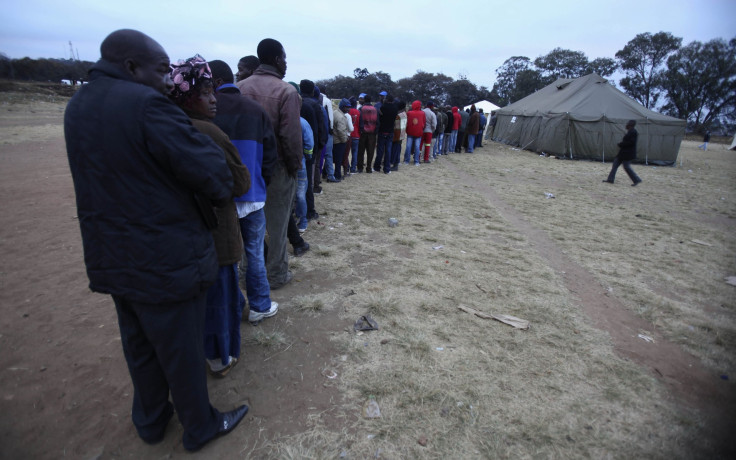Zimbabwe Votes: Lines Are Long, But Peace Reigns As Mugabe And Tsvangirai Square Off

Wednesday is voting day in Zimbabwe, and voters are braving the cold weather to wait in long lines all across the country, in a process that's so far been peaceful and in stark contrast to the country's last elections in 2008.
The people's ballots will decide whether President Robert Mugabe, 89, retains his post, or whether his long-time rival and current Prime Minister Morgan Tsvangirai, 61, can unseat him after unsuccessful attempts in 2002 and 2008.
The last presidential election, in 2008, erupted into violence, killing more than 200 people, after early counts showed Tsvangirai in the lead. He dropped out and became prime minister as part of a power-sharing agreement, but Mugabe and his Zimbabwe African Nation Union-Patriotic Front, or ZANU-PF, still exercise authoritarian control over the country of 13 million.
About 6.4 million people are registered to vote in this election. The Zimbabwe Electoral Commission reports that 9,735 polling stations are open today from 7 a.m. to 7 p.m. (1 a.m. to 1 p.m. EDT), with some early access granted to security workers who will be patrolling voting stations.
And, judging from the lines that began forming before sunrise, it would seem that civilians are not taking their ballot-box access for granted.
Mugabe's reputation for clinging to power is well known. He has ruled Zimbabwe for 33 years since it first gained independence from British rule in 1980, but has promised to respect the results of this election.
"If you go into a process and join a competition where there are only two outcomes, win or lose, you can't be both," he said, according to Reuters. "You either win or lose. If you lose, you must surrender."
However, Tsvangirai, who leads the Movement for Democratic Change, or MDC, has said the registration process was flawed and has voiced concerns about voters' access to polls in urban areas like Bulawayo and the capital city, Harare, which are both strongholds for the MDC.
"Mugabe is the world's oldest leader and one of its longest-ruling dictators," Tsvangirai wrote in a Washington Post editorial. "He is fixing this election in a more sophisticated fashion than previous ZANU-PF campaigns of beatings, killings and intimidation."
This is a critical election for both candidates, and polls indicate that the two are neck-and-neck when it comes to popular support. That hasn't stopped each candidate from predicting a landslide in his own favor, sparking concerns as to whether the loser will accept defeat.
Ongoing controversies would threaten the fragile peace in Zimbabwe, something international watchdogs and domestic monitors are keen to avoid.
Despite its vast mineral wealth, Zimbabwe's economy has gone through a series of crises over the past decade, with inflation skyrocketing to as high as 500 percent. While the economic situation has somewhat stabilized since then, broad-based development has been a long time coming. More than half the population lives in poverty, infrastructure is in shambles and the government is riddled with corruption.
Civilians are eager to effect change with this ballot, explained voter Isaac Rufaro to the Associated Press. He had risen before dawn to take his place in line at a polling station in Harare.
"It is moving slowly, but I am here for as long as it takes," he said. "We have got to get this done."
© Copyright IBTimes 2024. All rights reserved.











